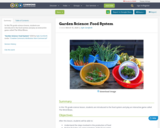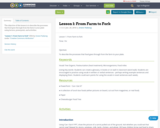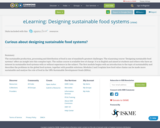
In this 7th grade science lesson, students are introduced to the food system and play an interactive game called The Wind Blows.
- Material Type:
- Activity/Lab
- Date Added:
- 02/12/2014

In this 7th grade science lesson, students are introduced to the food system and play an interactive game called The Wind Blows.

The objective of this lesson is to describe the processes that food goes through from the farm to your plate using lecture, powerpoint, and activities.

***This curriculum is provided by The Edible Schoolyard Project with full permission to share*** Understanding Organic: Connections to Action in the Garden Classroom is a garden and classroom-based curriculum for middle to high school students that explores the concepts and meanings of organic agriculture. The curriculum consists of a short preparatory unit, a sequence of ten core lessons, and twelve optional extension inquiries that can also be taught as standalone lessons. The ten core lessons utilize hands-on explorations of organic practices and feature textual analysis and open discussions to examine the complex meanings of organic. The final project workbook introduces students to a social action project in which students apply their knowledge and experiences to enact justice-oriented change related to organic. We recommend that you start by reading the curriculum overview linked below before reading individual lessons.

The sustainable production, processing and distribution of food is one of mankind's greatest challenges. The eLearning course ‘Designing sustainable food systems’ offers an insight into this complex topic.
The online course is available free of charge. It is in English and aimed at students and others who have an interest in sustainable food systems with or without experience in the subject. The first module begins with an introduction to the topic of sustainability and describes the problems in the global food system, together with possible solutions. Modules 2 and 3 explain how food value chains can be made more sustainable and analyse the role of food in the UN's Sustainable Development Goals (SDGs).